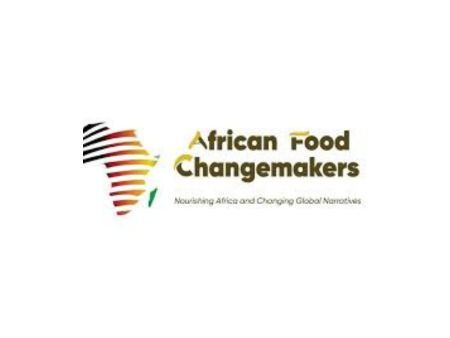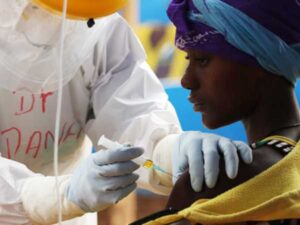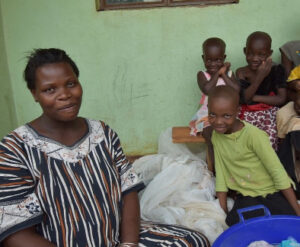The Africa Food Changemakers enables African entrepreneurs to start and scale resilient and sustainable agribusinesses that increase access to nourishing food across Africa. They also work to change global narratives about Africa by celebrating Africa’s contributions to the global food ecosystem.
Ndidi Okonkwo Nwuneli of African Food Changemakers spoke with Ashley Hopkinson on January 25, 2024. Click here to read the full conversation with insights highlighted.
Ashley Hopkinson: Can you start by introducing yourself and telling me about the problem that your organization set out to solve and how you are going about it?
Ndidi Nwuneli: My name is Ndidi Nwuneli. I’m a social entrepreneur based in Lagos, Nigeria. I wear a number of hats. The one that’s relevant to this is that I’m the Founder and Executive Chair of African Food Changemakers, which is a nonprofit I started in 2019.
We enable African food and agri-entrepreneurs to scale their businesses by providing them with the training, support & data from the community. Also, we ensure that we change global narratives about Africa by using food as a way to build bridges.
We work with entrepreneurs in forty African countries at the moment, and it’s through Skoll’s amazing support that we’ve been able to scale.
There are two problems that we’re trying to solve. The first problem is this narrative issue of the face of Africa being a hungry child. We wanted to change that narrative by telling positive stories about Africa’s contribution to the global ecosystem, and help people understand that they’re surrounded by food from Africa on a daily basis in their own lives. The single story is very dangerous; there are many different stories from the African continent.
The second problem is that most entrepreneurs in the food and agriculture landscape — while innovative & creative — are struggling to scale. They struggled to scale because they were working in isolation; they didn’t have the data, training, funding or a community of support.
We’re committed to enabling at least one million entrepreneurs to scale by providing the training & support they need with the use of technology.
Ashley Hopkinson: What makes your organization distinctive in this space, especially in the global space?
Ndidi Nwuneli: I think we stand out for two main reasons: we work on both the supply & demand side of the problem. Addressing one in isolation would be limited. Also, we really focus on community support. Instead of helping individuals, we’re helping drive an ecosystem of change by working with thousands of entrepreneurs. We use technology to break down the physical barriers between us & to connect entrepreneurs with each other.
Ashley Hopkinson: How, as an organization, do you measure success? What is the evidence that you’re making progress toward the big goals and mission that you have?
Ndidi Nwuneli: First, we’re aiming to reach a million entrepreneurs to join us as members and to build a strong community. We’re far from it right now; we currently have about three thousand active members, but we’re excited to see those numbers growing everyday.
For example, just last week, we got roughly three hundred new members. The magnitude of growth has been exponential. In the beginning, we had to work hard in trying to convince food & agri-entrepreneurs that this was a community that would be beneficial to them, but now, it’s snowballing. The numbers speak for themselves.
Second, it’s not just a numbers game. There’s a real impact on the lives of those entrepreneurs. Last year, through the support of Skoll, we launched two initiatives:
BRACE, which focused on helping entrepreneurs with climate resilience; and ‘Leading Women in Food Fellowship’ that focuses on the visibility of women changemakers.
In both cases, businesses have become strong & more resilient. They’ve formed valuable partnerships and many are beginning to raise financing to scale. Now, they also have a community of support. We took baseline surveys & are having regular check-ins with them, so this is not just anecdotal evidence; we have hard evidence to show that we’re making a difference.
Ashley Hopkinson: Is there a story of impact that you can share that you feel illustrates the value of work?
Ndidi Nwuneli: Recently, we were invited to participate in an event in Egypt: a multi-day event called CANEX [Creative Africa Nexus] which is a creative industries trade fair that — after intense lobbying — now included food for the first time.
It’s typically an event focused on fashion, but they expanded it to include food by creating a gastronomy space. We were able to bring entrepreneurs from all over Africa to meet each other & meet buyers, customers, and other members who have benefited from our training.
We also curated events, which were really exciting. It was all about innovating our food. We had celebrity chefs cooking alongside some of the business leaders. We also had chefs from Ghana, and the audience responded with hopes to get their own countries involved. But it wasn’t just about them cooking, we were also talking about our connections to food — like the chefs from the Caribbean who talked about how their food had influences from the African continent.
We talked about food from the farm to the fork: where the food came from & how it’s creating jobs and changing lives.We’d been working on this for so long. It was such a beautiful thing to see entrepreneurs & chefs on center stage — being celebrated. The supply side & demand side working together to elevate the importance of African food, that was a narrative change happening right there. It was such a beautiful thing to behold.
Ashley Hopkinson: Do you think that the general public misses the connection between the wonderful food they’re eating, its cultural significance, and the agriculture behind it? And do you find that people are making that connection?
Ndidi Nwuneli: By working on both the supply & demand side, we are making sure that connection is made. The food ecosystem is so important to Africa, so we’re working to highlight the traceability of food sourced from African soil. First, it tastes good & it’s packaged well, so you enjoy it.
But we’re adding to that narrative by helping you realize that because you bought that food, a farmer’s life is getting better & more jobs are being created.
We have a marketplace where entrepreneurs get to trade, work & partner with each other. Ultimately, this leads to improved livelihoods on the African continent through economic growth & changed narratives.
We believe we have some of the best food in the world, so we’re committed to showcasing that by putting entrepreneurs at the forefront of that change.
Ashley Hopkinson: What insight or teachable lesson can be taken from your work that others could use if they wanted to do something similar in a different geography?
Ndidi Nwuneli: The first thing is the importance of embedding scale into your DNA from the beginning. There’s a place for small pilot projects, but there’s also a place for addressing big problems at scale.
What we’ve learned is the power of technology to enable you to reach more people and to break down geographic barriers. By using technology, we’ve created an online hub that has data, funding, events & training. It’s a one-stop shop for food and agri-entrepreneurs.
We need that for more communities in more sectors because there’s an information asymmetry that slows us down as social entrepreneurs. If we can invest the time & energy to make it easier for our participants & our beneficiaries to find what they need from a trusted place, that allows us to reach more people exponentially.
Even though we only have 3,000 active members, we have about 150,000 who use our content on a regular basis. Our hope is to be able to reach millions.
Second, oftentimes we only address problems from one side of the puzzle. Sure we can’t address every problem ourselves, but after working in the food and agri space for 15 years, unless we can work on the storytelling piece, all our good work doesn’t change anyone’s behavior. People still want to sell a narrative that Africans are dependent on the rest of the world because it pays them to do so. We’ve neglected to tell stories about what we’re doing in order to shatter those myths.
We forget the power of positive narratives. You cannot neglect it because even when you have change, nobody knows that because we usually tell the negative stories to get funding. The hungry child has been able to win a lot of grants, but we’re not going to use that hungry child image anymore. We’re going to show them that a successful female entrepreneur is creating great food to feed hungry children in Africa, so we don’t need your food.
We have to hold ourselves accountable in the development and social enterprise landscape to be careful about the stories we tell because some of them stick and continue to have negative impacts. They can backfire and harm us when we’ve actually solved a problem.
We have to be careful about what we put in the public domain. We need to be honest about our shortcomings but still make sure we tell multiple stories so that a single story doesn’t stick.
Ashley Hopkinson: What have you learned along the way in terms of something that you’ve tried that didn’t quite stick or didn’t quite meet your expectations?
Ndidi Nwuneli: The biggest lesson I’ve learned is that managing a technology enabled business is very, very different from managing a bricks and mortar training organization. Technology employees are quite different; their incentives and language are different. We’ve had a harder time finding and retaining programmers & coders. It’s been really difficult to understand how to motivate within this industry.
It requires different skills to manage & engage them in our work. They are not ‘in the field’ since they’re not interacting with the entrepreneurs on a regular basis. They don’t get that instant gratification of knowing the impact of their work. We’ve actually started taking our tech folks on field trips to meet our entrepreneurs so they can better understand what this is all about. It’s been one of the biggest challenges we’ve had to face.
Ashley Hopkinson: How would you describe systems level change in your field as far as how your organization is working toward it?
Ndidi Nwuneli: As an individual, I’m involved in about four different organizations in the food ecosystem; so I definitely tie the knots & connect the dots between all the organizations. The beauty of the work that we do is how it’s at the nexus of climate, gender & health.
Climate change is affecting the food system. With floods & droughts, it’s really adding a new element of stress to farmers. It’s also making it more difficult for lower income populations to afford healthy diets with food prices rising all over the world. The women in our BRACE program have been the most affected by the food shocks that have limited our food. Our work really needs to take on a holistic approach to solve these problems.
We do convenings in partnership with our sister company, and recently, we had a Changemakers Conference to talk about what needs to be done to address these compounding issues across the system. We’ve also partnered with other organizations to do similar things, leading action to impact, how policymakers engage & support our cohort of partners that are addressing the urgent need for change as an ecosystem. It’s been a combination of different approaches.
Ashley Hopkinson: What do you think is needed from other people in the food ecosystem to help to advance this systems change?
Ndidi Nwuneli: Partners & collaborators. We definitely need to partner with policymakers within governments at the state, federal & regional levels. We’re also partnering with the private sector: financial institutions –the banks, agri-desks — and all the industry associations. We also collaborate with organizations. Some examples are Kids, an online marketplace for sustainable products; Lagos State Employment Trust Fund Law (LSETF), to give funding to entrepreneurs; Care International, to support locally led initiatives, etc.
Ashley Hopkinson: What’s your vision for the organization in the next five years?
Ndidi Nwuneli: As I mentioned, I want us to get to a million entrepreneurs that are not only nourishing Africa — creating jobs, building livelihoods, developing sustainable businesses — but I want our work to substantially change narratives. We would love to see more of our entrepreneurs operating across Africa with a scalable business model, to see more high quality African food products on global shelves. Overall, we’d just love to have more substantive partnerships across the ecosystems to drive change.
Click here to read the full conversation with insights highlighted.
Ashley Hopkinson is an award-winning journalist, newsroom entrepreneur and leader dedicated to excellent storytelling and mission-driven media. She currently manages the Solutions Insights Lab, an initiative of the Solutions Journalism Network. She is based in New Orleans, Louisiana.
* This interview has been edited and condensed.







